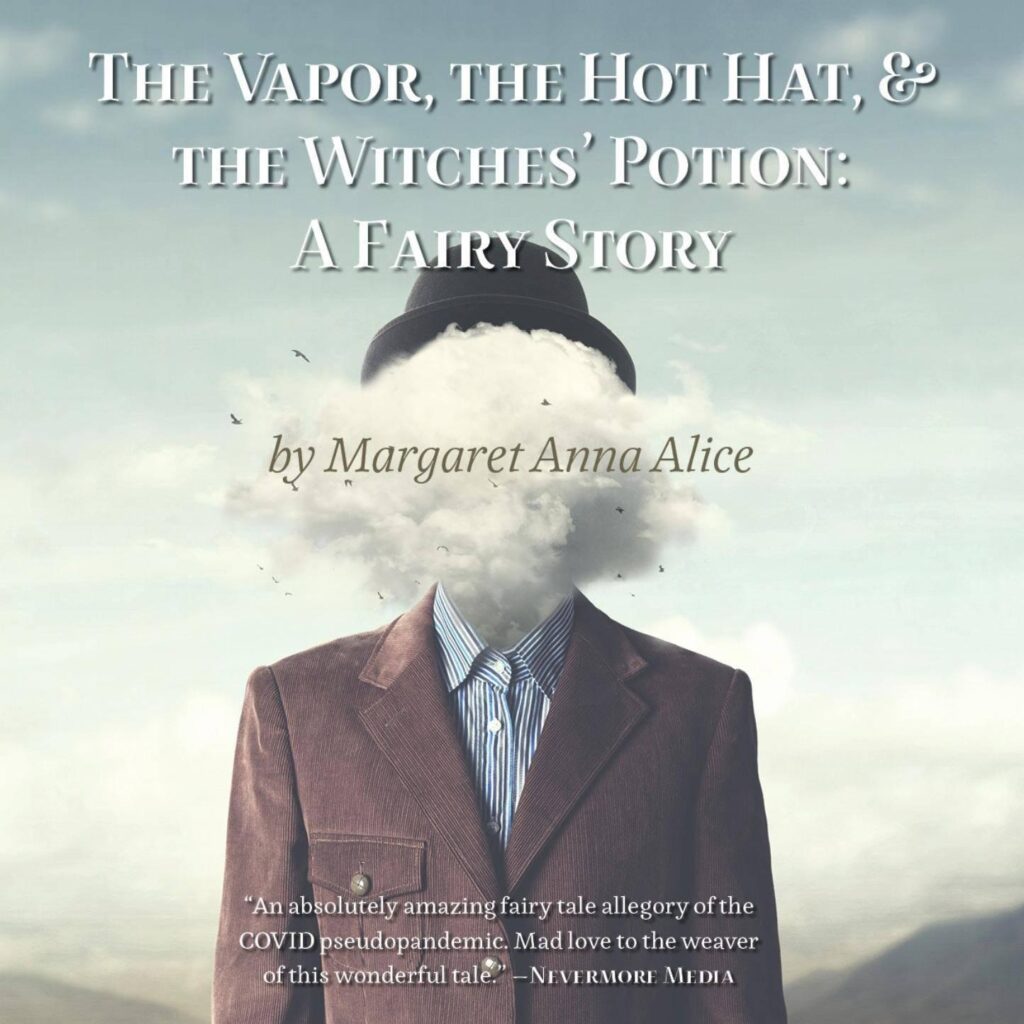
(Note from the Editor – Thank you to Margaret Anna Alice for putting a quote from Nevermore on the cover of her children’s book. It’s encouraging to know that someone as talented as Margaret Anna Alice would want to be associated with anarchist agitators such as yours truly. It will surprise no one to learn that we have become estranged from some of our former comrades since launching this project, some of whom we struggled alongside in very intense campaigns. The good news that we have also made new friends from around the world, among whom I count Paul Cudenec, Dave Amis, and Margaret Anna Alice. There are have been currents of free-thinking in many different places, and as they join together, they gather force, and as in time many tributaries form a river, likewise do the combined energies of free-thinkers form a movement. May that river grow stronger and stronger, until it is mighty enough to wash away the grime of deceit that has sullied the world.)
The Vapor, the Hot Hat, and the Witches’ Potion: a Fairy Story
Once upon a time in a prosperous land, a rumor swept across the kingdom that there was an invisible vapor floating through the air. Many vapors had come before, but this one was so extraordinary, it called for an extraordinary response.
This vapor, the town criers cried, could kill you at any time, anywhere. You could get it by talking, breathing, or singing. You could get it by standing or walking too closely to someone. You could even get it by playing. And the scariest thing of all—you could get it and not even know you had it.
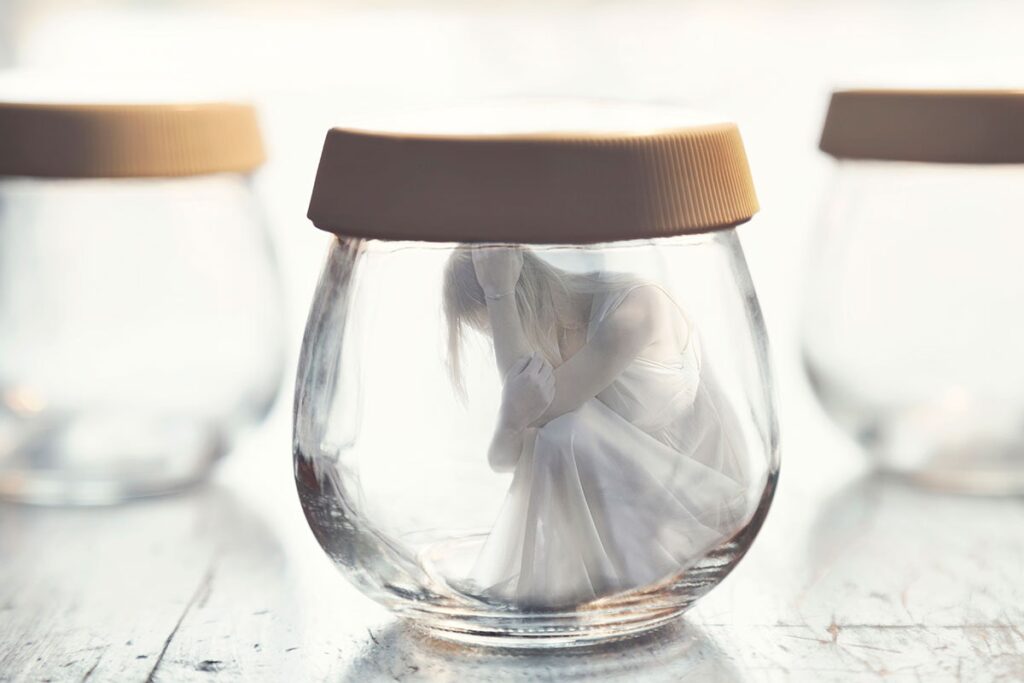
The only way to escape was to hide indoors, keep away from people, and rub your hands with a clear jelly every time you touched something. Merchants stopped trading, apprentices stopped learning, and people stopped seeing people.
Every day, the town criers yelled out the number of people who had caught the vapor, although most didn’t know it since they felt the same as usual—just a lot more scared. They only learned they had it because of a certain spell a sorcerer had written down before the vapor came.
The sorcerer had said it wasn’t supposed to be cast for vapors and couldn’t tell people if they had caught a vapor or not. But the sorcerer had died, and the king’s counselors decided to cast the spell, anyway, and that is how people found out they had the vapor.

The town criers shouted the latest death tolls so often their voices grew hoarse. Almost every one who died was very, very old or very, very sick or very, very fat. Hardly anyone else died, and at the end of the year, it would turn out about the same number had died as had in other years.
Still, it was a very scary vapor, and the entire kingdom had to change for the good of the public. The land was no longer prosperous, but the king just minted more coins and tossed them out to his subjects so they wouldn’t notice right away.
Eventually, people were told they could come out of hiding and the marketplace could open back up if everyone followed a few rules.

They had to wear a hot, scratchy hat that covered their ears and eyes so the vapor couldn’t get into their earholes or eyeholes. They had to hop five times forward and five times backward if they accidentally got too close to another person. And, of course, they had to rub their hands with jelly after touching anything.
Some people thought the hats looked silly and were even a little dangerous since they made it hard for them to hear and see and made them sweat in the summer. The hopping took so much time, people weren’t able to get much done.
When those people didn’t wear the hats or hop around, the rest of the people got very, very angry and said it was their fault people were dying and getting sick and couldn’t live the way they used to live. Some even took to wearing two or more hats for extra protection against the anti-hatters and anti-hoppers.

Every so often, the king would tell people to hide back inside again because too many people were catching the vapor. They couldn’t work or shop or visit people they loved. There wasn’t much to do besides lie around listening to the town criers, who always let people know how scared and angry and resentful they should all feel, especially toward the anti-hatters and anti-hoppers.
Suddenly, people started feeling more hopeful. A few witches who were richer than all the world’s kingdoms and queendoms combined offered to make a potion people would need to swallow every so often to keep them safe from the vapor—but it would only work if everyone drank it together.
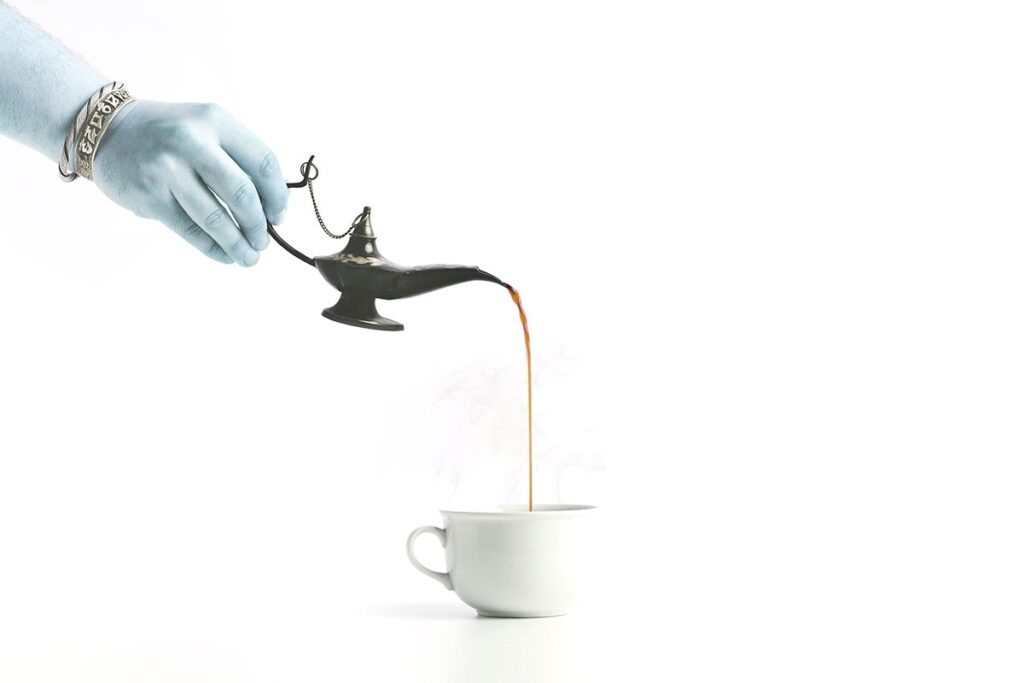
It took a few months, but eventually the witches each had their own flavor—grape and orange and tropical punch—and they were ready to pour them into people’s mouths. Whenever potions had been made in the past, the witches had had to spend years and years making sure it was safe before giving it to people.
This time, though, the vapor was so scary, they skipped all those steps so people could be saved sooner. They even got the king to issue a special decree so no one could hurt the witches if anything bad happened to them after drinking the potion.
The king gathered three-quarters of the coins he had collected from the people that year and presented them to the witches.

Almost everybody couldn’t wait to drink the grape or orange or tropical punch potion. They bragged about going to get it and told everyone after they got their first and second drinks. When they came across someone who didn’t want to drink it, they got very, very cross. The town criers told everyone to yell at the anti-drinkers because it was their fault they couldn’t go back to life like it was before the vapor.
Something strange happened after people started drinking the potion. Some of them caught the vapor, anyway, but that was because it was a version of the vapor the witches hadn’t planned for—still, it was important to drink both doses of the potion because it was better than not drinking them.
To be safe, though, the town criers said they should go back to wearing hot hats and hopping—although most hadn’t stopped to begin with because they were afraid of what would happen if they did (or worse, they might be mistaken for an anti-hatter, anti-hopper, or anti-drinker).

Even stranger, some of the people who had drunk the potion died either right after or not long after drinking it. Unlike the people who died from the vapor, these people were often very, very young or very, very healthy or very, very fit. The town criers never shouted about these deaths. If anyone brought it up, they called them an anti-hatter, anti-hopper, and anti-drinker.
Being an anti-drinker was the worst of all because everyone knows you need to drink to survive. If you’re against drinking the potion, you must surely be against drinking water, too, and we all know you can’t live without drinking water.
Not everyone who drank the potion died. Some just had peculiar things happen to their bodies. They shook all the time or got rare diseases or noticed parts of their bodies stopped working. They were bedridden or lame or hurt in different ways and couldn’t live the way they did before or even after the vapor. The town criers didn’t tell anyone about these people, either.
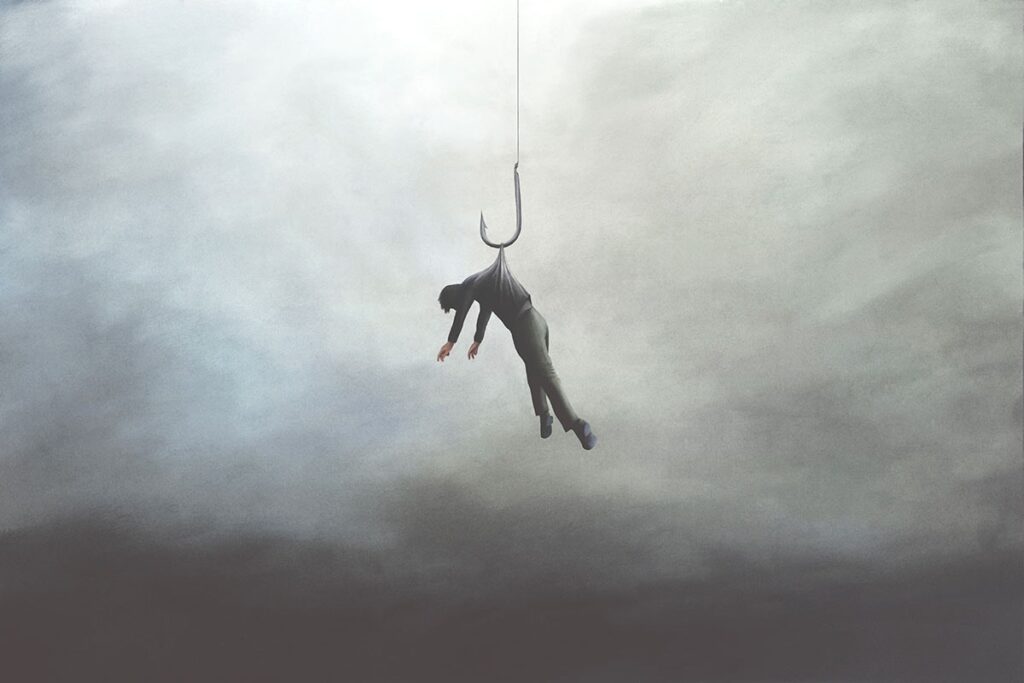
And then there were the drinkers who felt perfectly fine … for now. The potion had never been tried for longer than a few months, so no one was really sure what would happen in the next year or two or longer. It was also a different kind of potion than anyone had ever drunk before. This potion changed something inside you that could never be undone.
People would also need to drink new versions of the potion every few months, and the king would need to continue giving three-quarters of the kingdom’s coins to the witches forever, or at least as long as the kingdom existed.

All the surviving drinkers were grateful to the witches and thanked them for saving their lives. They proudly displayed a mark on their chin that meant they’d drunk the potion. The ones who’d drunk it twice had two marks.
Those who didn’t have any marks were to blame for the kingdom’s problems. They weren’t permitted to shop in the marketplace or work or apprentice or take part in any public activities. They were shamed and shunned for being a threat to the people of the land.
These people started to feel like they should leave the kingdom, but they weren’t allowed to travel without the double marks, and besides, all the other kingdoms and queendoms were the same as theirs, anyway. There wasn’t anyplace left where people weren’t afraid of the vapor and where they didn’t demand that everyone drink the potion.
Soon, the king decided the anti-drinkers were so dangerous, they would need to be locked in a dungeon until they agreed to drink the potion. They were free to choose whichever flavor they liked. If they decided not to drink, they would simply remain in the dungeon. It was entirely up to them.

One year passed, and then another. There were fewer and fewer people left in the kingdom. Eventually, so few people were left, the king could no longer collect enough coins to pay the witches. The rest of the kingdoms and queendoms around the world were in the same fix. They decided to join together into one king-queendom so they could collect enough coins to buy the potion.
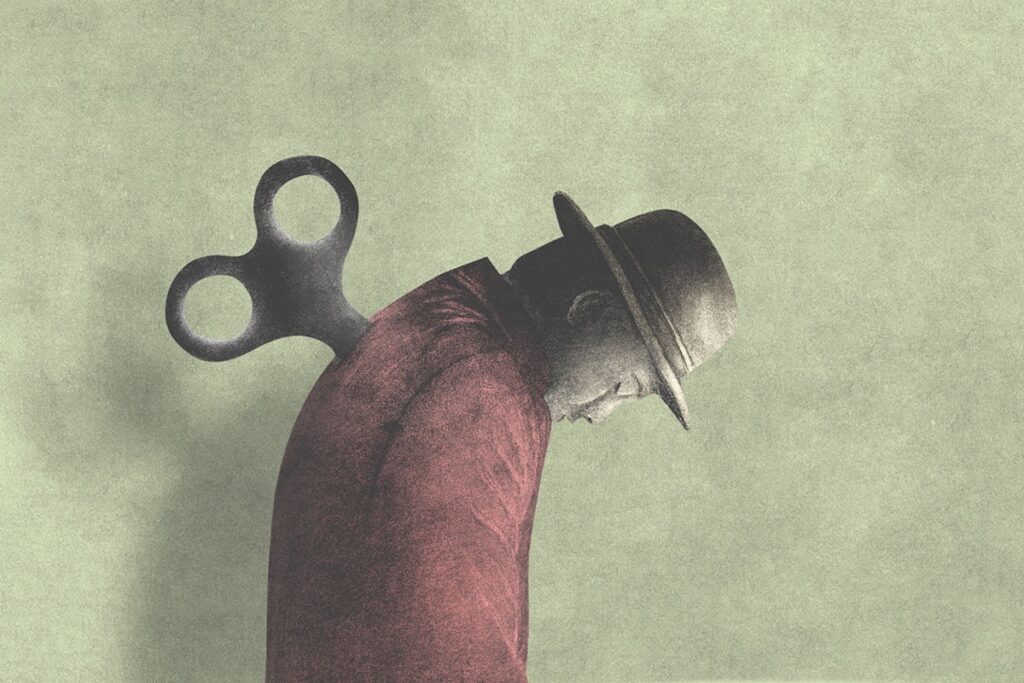
After eight more years passed, there weren’t enough people left in all the world to cover the witches’ dues. The rulers decided everything that belonged to the people now belonged to the king-queendom. The people could still live in their hovels, but they wouldn’t own anything. They could earn their keep through labor—indeed, they might be put to work making the potion!
People no longer needed to decide what they wanted to do or be in life because the king-queendom would decide for them. People didn’t need to pay for anything because all the subjects got equally small amounts of the necessities. Everyone looked the same, acted the same, and thought the same.
Most people didn’t remember what it was like before the vapor. Some didn’t even know there was such a time.
The rulers, on the other hand, never wanted for anything. Nor did their friends, the town criers. The witches were the wealthiest of all—and deservedly so, as they had saved the world from the deadly vapor.
It wasn’t long before there were no more subjects. The rulers, the counselors, the town criers, and the witches had all the earth’s riches to themselves, and they lived happily ever after.
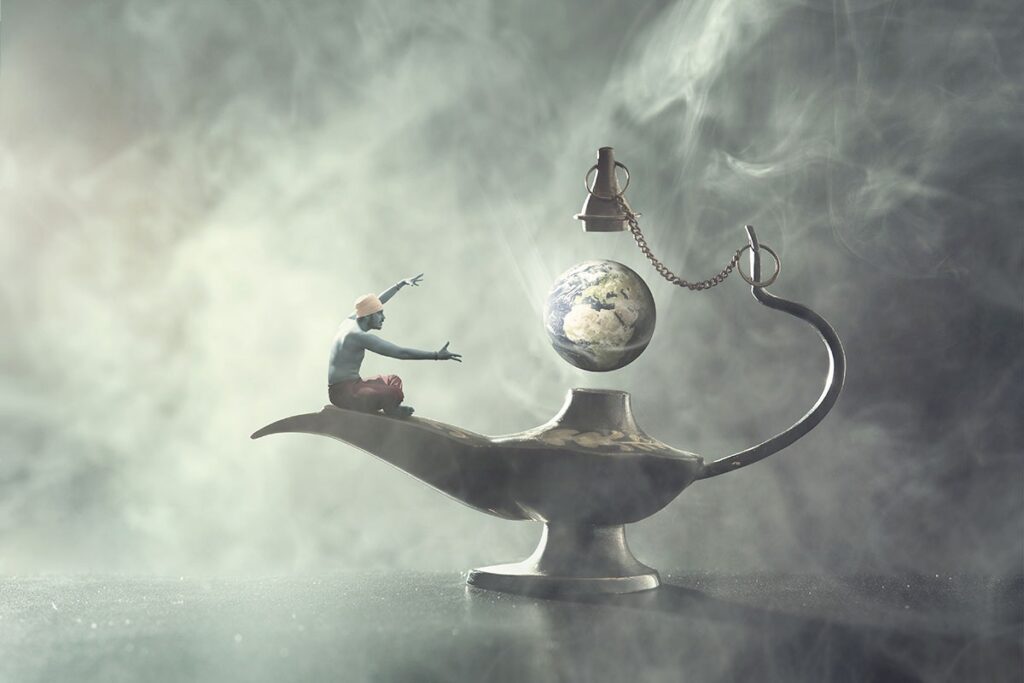
(Margaret Anna examines propaganda, neuropsychology, culture, linguistic programming, and mass control in her aim to awaken the sleeping before tyranny triumphs. Visit her blog to read more of her work or buy her a coffee.)